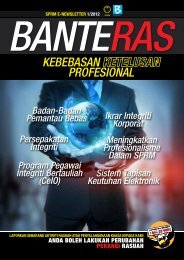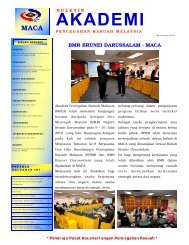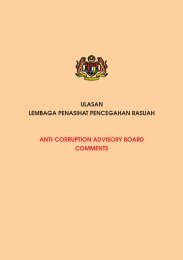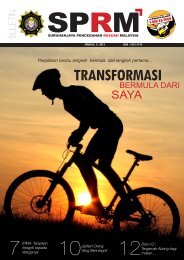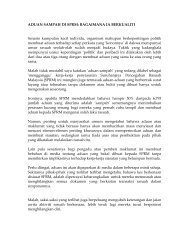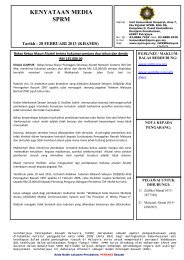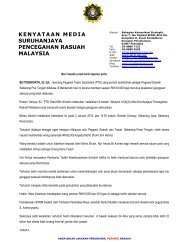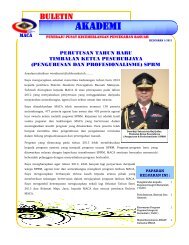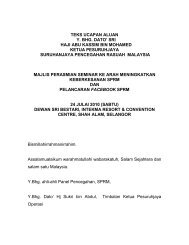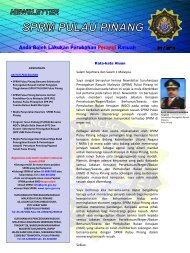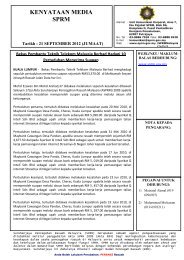eNewsletter SPRM - IAACA Conference 2012
eNewsletter SPRM - IAACA Conference 2012
eNewsletter SPRM - IAACA Conference 2012
You also want an ePaper? Increase the reach of your titles
YUMPU automatically turns print PDFs into web optimized ePapers that Google loves.
<strong>IAACA</strong> CONFERENCE <strong>2012</strong>6th Annual <strong>Conference</strong> & General Meeting of the International Association ofAnti-Corruption Authorities. 4th - 7th October, Kuala Lumpur Convention CentreTechnical Assistance & Information Exchange
EVENT PROGRAMMEPhil MatshezaGlobal Policy Advisor, Anti- Corruption and InternationalPrinciples Cluster Leader, Democratic GovernanceGroup, Bureau for Development Policy, UNDPLaura PopFinancial Market Integrity, Vice-President, Financial andPrivate Sector, World Bank4.30pm – 6.00pm / Plenary Session 4Capacity Building: The Importance of TechnicalAssistanceMODERATORDr. Eduardo VetereVice-President, International Association of Anti- CorruptionAuthorities, Former Director of the Division for TreatyAffairs, United Nations Office on Drugs & Crime (UNODC)SPEAKERS:Datuk Seri Idris JalaCEO of PEMANDU, Minister in the Prime Minister’sDepartment, MalaysiaMartin Kreutner<strong>IAACA</strong> Executive Committee, President, EuropeanPartners against Corruption Network (EPAC/ EACN),Chair of the International Steering Committee,International Anti-Corruption Academy (IACA),Republic of Austria.Arkan El SeblaniRegional Project Manager, Anti- Corruption and Integrityin the Arab Countries, UNDPFrancois BadieHeadof Central Service for the Prevention of Corruption,Ministry of Justice, FranceProfessor Pakdee PothisiriCommissioner, National Anti-Corruption Commission(NACC) ThailandProfessor Iryna NizhynskaProfessor of the Chair of Civil & International Law,National Academy of Internal Affairs, UkraineSaidov Fatoh GoibovichDirector, Agency for Financial Control and Counter withCorruption, TajikistanGiovanni KesslerDirector-General, European Anti-Fraud Office (OLAF)Saturday, Oct 6 <strong>2012</strong>9am -11am / Workshop A - Proactive Investigation: Staying Ahead (Two Parallel Workshops)1A. Whistle Blower Act & Witness ProtectionSchemes: Pitfalls & Best PracticesMODERATORDimitri VlassisChief, Corruption and Economic Crime Branch,Division for Treaty Affairs, United Nations Office onDrugs and Crime (UNODC)SPEAKERS:Dr Vincent Cheng YangProfessor and Personal Chair in International Law,University of Saint Joseph (Macao), CanadaJohn McFarlaneAssociate Investigator, Centre of Excellence in Policingand Security (CEPS), Strategic and Defence StudiesCentre, Australian National University, AustraliaKenan TurVorstand/ Executive Board Member,Business Keeper AG, GermanySrirak PlipatAsia Pacific Regional Director, Transparency International(TI)2A. Difference in Approaches:Private & Public Sector InvestigationMODERATORAbdesselam Aboudrar<strong>IAACA</strong> Executive Committee Member, Chairman, CentralAuthority for Corruption Prevention, MoroccoRAPPORTEURMichael SymonsManaging Director, Anti-Corruption Consultants AustraliaSPEAKERSDatuk I.G. ChandranChief of Forensic Accounting, Malaysian Anti-CorruptionCommissionRaymond SoAssistant Director of Operations, Independent CommissionAgainst Corruption, Hong Kong Special AdministrativeRegion, People’s Republic of ChinaJaganathan SaravanasamyAssistant Director, Anti-Corruption Sub- Directorate,International Criminal Police Organisation (INTERPOL)03
EVENT PROGRAMMEDr. Nikos PassasProfessor, School of Criminology and Criminal Justice,North Eastern University, United States of AmericaKharabsheh AbedAnti-Corruption Commission, Jordan11.00am - 1.00pm / Workshop B: PerformanceAccountability & Integrity in GovernmentAdministrative and Business Practices(Two Parallel Workshops)IB. Corruption & Integrity : Codes of Conductand EnforcementMODERATORKamran AliyevIAP Executive Committee Member, Director of theAnti- Corruption Department, General Prosecutor’sOffice, Republic of AzerbaijanRAPPORTEUREvalina YimPrincipal Youth & Education Officer, CommunityRelations Department, Independent Commission AgainstCorruption, Hong Kong Special Administrative Region,People’s Republic of China.SPEAKERSHenrik Helmer SteenDeputy Public Prosecutor, Office of the Director of PublicProsecutions, DenmarkDr. Julio F. VitobelloHead of Anti-Corruption Office, Ministry of Justice,ArgentinaIrfan QadirAttorney-General, PakistanPaul Lachal RobertsLegal Adviser, European Anti-Fraud Office Office (OLAF)Nihal Sri AmeresekereChairman, Consultants 21 Limited, Sri Lanka2B. Taking a Stand Against Corruption:Creating Functional Stakeholder PartnershipsMODERATORGeorge ProuseTeam Leader, Royal Canadian Mounted Police (RCMP),CanadaRAPPORTEURNg Hung CheungPrincipal Corruption Prevention Officer,Corruption Prevention Department, IndependentCommission Against Corruption, Hong KongSPEAKERSDatuk Mustafar bin AliDirector of Investigations, Malaysian Anti-CorruptionCommissionProfessor David LovellHead of School of Humanities and Social Sciences,University of New South Wales, Defence Force Academy,AustraliaTatsuya SakumaDirector, United Nations Asia and Far East Institute forthe Prevention of Crime and the Treatment of Offenders(UNAFEI), JapanTalat Faruq LoneConsultant, International Bar Association, PakistanBertrand de SpevillePrincipal, Anti- Corruption and Governance Consultants,United KingdomLarissa GrayConsultant, Financial Market Integrity Unit, World Bank2.30pm - 4.00pm / Workshop CInternational Recovery of Ill-Gotten Assets:Case Histories (Two Parallel Workshops)IC. Asset Forfeiture & International CooperationMODERATORPaulus NoaDirector, Anti- Corruption Commission, NamibiaRAPPORTEURSebastian SalPartner, Sal & Morchio - Attorneys at-Law, ArgentinaSPEAKERSApsari DewiHead, Sub-Division of International Cooperation of KejaksaanAgung, IndonesiaGretta Fenner ZinkernagelManaging Director, Basel Institute on Governance,Swiss FederationMedenica VesnaPresident of the Supreme Court,Republic of Montenegro04
EVENT PROGRAMMETammar BergerStolen Asset Recovery (StAR) Initiative, World BankJosaia K. NaigulevuDeputy Director of Public Prosecutions,Ministry of Justice, Solomon Islands2C. Political Commitment & Expertise in DenyingSafe HavensMODERATORSimon LokodoState Minister for Ethics and Integrity, Office of thePresident in the Ugandan Cabinet, UgandaRAPPORTEURRasib GhaffarBarrister of Lincoln’s Inn, United KingdomSPEAKERSDr. Keebong PaekSenior Prosecutorial and Judicial Adviser, United NationsOffice on Drugs and Crime (UNODC)Michael J. HershmanPresident and CEO of Fairfax Group, MalaysiaDr. Claire A. DaamsFederal Attorney, Office of the Attorney-General,Swiss FederationProfessor Sun ZhuangzhiVice-President and Secretary General, China Anti-Corruption Research Centre, Chinese Academy of SocialSciences (CASS), ChinaShervin MajlessiRegional Anti-Corruption Adviser, Regional Centre forEast Asia and the Pacific, United Nations Office on Drugsand Crime (UNODC)4.30pm - 6.00pm / D. The Role of Prosecutorsand Judiciary in Combating Corruption(Two Parallel Workshops)1D. The Art of Prosecuting Corrupt Practices& Abuse of PowerMODERATORAbdul Kadir bin SulaimanFormer Federal Court Judge, MalaysiaRAPPORTEURAldila SallehPrincipal Counsel & Head of Criminal Justice Division,Attorney General’s Chambers, Brunei DarussalamSPEAKERSAnthony Kevin MoraisDeputy Director, Legal and Prosecution Division,Malaysian Anti-Corruption Commission, MalaysiaKevin P. ZervosDirector of Public Prosecutions,Department of Justice,Hong Kong Special Administrative Region, People’sRepublic of ChinaDr. Franz PlochlDeputy Procurator General, Procurator General’s Office,Republic of AustriaMahamoud SoilihiAttorney General, Court of Appeals,Federal Islamic Republic of the ComorosKenneth C. KohlResident Legal Advisor, American Embassy in Malaysia4.30pm - 6.00pm 2D. Corruption & The Role ofJudiciary in Combating CorruptionMODERATORSatyajit Boolell SCMember of the Executive Committee of IAP,Director of Public Prosecutions, Republic of MauritiusRAPPORTEURChuah Chang ManChief Senior Assistant Commissioner,Malaysian Anti-Corruption Commission, MalaysiaSPEAKERSMedenica VesnaPresident and Chief Justice of the Supreme Court,President of the Judicial Council,Republic of MontenegroMohd Juanda Ab. RashidDirector of Anti-Corruption Bureau, Brunei DarussalamBasile ElombatVice President of IAP, Magistrate, Court of Appeal ofNorthern Garoua, Republic of CameroonSamir AnnabiHead of the Tunisian Anti-Corruption Authority,Republic of TunisiaAdil AbilovAssistant Minister of Justice, Ministry of Justice,Republic of Azerbaijan05
EVENT PROGRAMMEWang XiumeiProfessor of Law, College for Criminal Law Science,Beijing Normal University, People’s Republic of ChinaSunday, Oct 7 <strong>2012</strong>8.30 am - 11.00am Plenary Session 4:Workshop Reports and General DiscussionDatuk Seri Abu Kassim MohamedChief Commissioner Malaysian Anti-CorruptionCommissionProfessor Cao Jianming<strong>IAACA</strong> President, Prosecutor General of the SupremePeople’s Procuratorate, ChinaMODERATORBulelani NgcukaGeneral Counsellor of <strong>IAACA</strong>, Former National Directorof Public Prosecutions, South AfricaSPEAKERSNg Hung CheungPrincipal Corruption Prevention Officer, CorruptionPrevention Department, Independent CommissionAgainst Corruption, Hong KongEvalina YimPrincipal Youth & Education Officer, CommunityRelations Department, Independent Commission AgainstCorruption, Hong KongMichael SymonsManaging Director, Anti-Corruption ConsultantsAustraliaSebastian SalPartner, Sal & Morchio – Attorneys of Law, ArgentinaRasib GhaffarBarrister of Lincoln’s Inn, United KingdomOne Officer from MACCOne Officer from the Attorney-General’s Chamber,Brunei11.45am - 12.30 pm / Closing CeremonyMODERATORDr. Eduardo Vetere<strong>IAACA</strong> Vice- President, Former Director of the Divisionfor Treaty Affairs, United Nations Office on Drugs andCrime (UNODC)SPEAKERSTan Sri Muhyiddin YassinDeputy Prime Minister of Malaysia06
KEY SPEAKER’S PROFILEProfessor Cao JianmingProfessor Cao Jianming is a native of Nantong, Jiangsu Province. He obtaineda postgraduate law degree from East China Politics and Law University.Cao has won numerous accolades in his student days, these includes“homecoming student that has outstanding contributions”, “a young andmiddle-aged expert that has outstanding contributions of the national level”,“one of the 10 outstanding legists in China”, “one of the 10 talents inuniversities in Shanghai”, and “one of the 10 outstanding youths in Shanghai”,among others. He began to enjoy the special government subsidy ofthe State Council in 1992, and was selected by the “1 million talents project of China” in 1997. Cao hasspent most of his career at East China Politics and Law University. He served as vice-president of the SupremePeople’s Procuratorate from 1999-2008. He became Procurator-General of the Supreme People’sProcuratorate in 2008. Cao Jianming was an alternate member of the 16th CPC Central Committee and isa member of the 17th CPC Central Committee.Dimitri VlassisDimitri Vlassis holds a law degree from the University of Athens (Greece)and an LL.M. (Master of Laws) from the University of Miami (U.S.A.). He isan attorney in Greece, a member of the Athens Bar Association, and Secretaryof the <strong>Conference</strong> of the Parties to the United Nations Conventionagainst Corruption. Vlassis was recruited by the United Nations in 1989. Hewas principally responsible for the organisation and servicing of the NaplesWorld Ministerial <strong>Conference</strong> on Organised Transnational Crime (November1994), as well as for the International <strong>Conference</strong> on the Preventionof Money Laundering and the Control of the Proceeds of Crime (Courmayeur, Italy) (June 1994), as well asthe High-level Political Signing <strong>Conference</strong> for the United Nations Convention against Corruption (Mérida,Mexico, December 2003). Vlassis has been actively involved in the technical cooperation programme of theOffice, leading or participating in needs assessment and advisory services missions in numerous countries,including Cambodia and Somalia (in the context of peace-keeping missions of the United Nations).07
KEY SPEAKER’S PROFILEBertrand de SpevilleSince stepping down in 1996 as the Commissioner of the IndependentCommission Against Corruption of Hong Kong (ICAC), Speville has advisedgovernments and international organisations on various aspects of anticorruptionpolicy and practice. He was the adviser to the Council of Europe’sMultidisciplinary Group on Corruption from 1997-2003 A lawyer byprofession, Speville practised in the private and public sectors in Londonand Hong Kong and was Solicitor General of Hong Kong before being askedto turn his attention to corruption and good governance. He is the author of‘Overcoming Corruption - The Essentials’ (2010).Datuk Seri Idris JalaDatuk Seri Idris Jala is the current Minister without Portfolio in the PrimeMinister’s Department and chief executive officer of the Performance Managementand Delivery Unit (PEMANDU). Established in 2009, PEMANDU isa unit under the Prime Minister’s Department, whose main role and objectiveis to oversee the implementation, assess the progress, facilitate as wellas support the delivery and drive the progress of the Government TransformationProgramme (GTP) and the Economic Transformation Programme(ETP). Before that, he used to work for Shell (1993–2003). In 2005, theMalaysian government elected him as CEO of Malaysia Airlines to curb the massive losses of the company.In February 2006, he announced the airline’s business turnaround plan from a 9-month loss of USD400million suffered in 2005 to achieving a record profit of USD260 million over a two-year period from 2007-2009. Jala holds Shell Sabbatical (Masters Degree), Warwick University, UK in Industrial Relation in 1987and B Soc Sc in Development Studies and Management from Universiti Sains Malaysia.08
KEY SPEAKER’S PROFILEMartin KreutnerMartin Kreutner is Chair of the International Transition Team of the InternationalAnti-Corruption Academy (IACA) as well as Executive Secretaryof her Provisional Commission. He holds a Master degree in law from theUniversity of Innsbruck, and in 2004 obtained an additional Master’s gradein Policing and Public Order Studies from the University of Leicester, U.K.Kreutner is a certified court expert on criminology has delivered lectures oninternational humanitarian law as well as on corruption and security topicsat numerous universities, academies and institutions all over the globe. Heis the President of the European Partners Against Corruption network (EPAC) and the EU’s anti-corruptioncontact point network (EACN), member of the Executive Committee (EC) of the International Associationof Anti-Corruption Authorities (<strong>IAACA</strong>), member of Interpol’s International Group of Experts on Corruption(IGEC), member of the International Advisory Board of the Malaysia Anti-Corruption Academy (MACA), memberof the Advisory Board of Transparency International – Chapter Austria, (alternate) Head of Delegation toall <strong>Conference</strong>s of the States Parties to the UNCAC, alternate Head of Delegation to GRECO (2007-2011),former Chairman of IACA’s Steering Committee (2008-2011), former Vice-President and member of the ECof the European Healthcare Fraud and Corruption Network (EHFCN); he is a senior anti-corruption consultant,evaluator and peer reviewer for, inter alia, the UN, the Council of Europe, Transparency International,and the World Bank. He is the author of many articles and papers on anti-corruption and security issues,editor of books on corruption (2006, 2008, 2010) and co-author of a legal commentary (2005, 2009).Datuk Mustafar AliDatuk Mustafar Ali hold a Masters Degree in Criminal Justice from theUniversity of New Haven in Connecticut, USA. He is the Director of Investigationswith the Malaysian Anti-Corruption Commission. Prior to joining theMACC Datuk Mustafar was the Deputy President at the Integrity Institute ofMalaysia (2004-2010).09
KEY SPEAKER’S PROFILEMichael J. HershmanMichael Hershman is President and CEO of the Fairfax Group. He is aninternationally recognised expert on matters relating to transparency, accountability,governance and security. The Fairfax Group has advised governments,corporations and international financial institutions on issuespertaining to the conduct of senior-level officials and/or the entities withwhich they do business. Before founding the Fairfax Group, Hershman wasDeputy Auditor General for the Foreign Assistance Programme of the U.S.Agency for International Development (USAID), where he was awarded theSuperior Honour Medal. He was appointed Independent Compliance Advisor to the Board of Directors ofSiemens AG in 2006. Hershman began his career in Europe as an investigator during the late 1960s. Afterleaving the military, he moved to investigations of government misconduct and financial fraud in the NewYork State Attorney General’s Office and the Office of the Mayor of New York City. He later served as SeniorStaff Investigator for the Senate Watergate Committee and as Chief Investigator for a joint Presidential andCongressional Commission reviewing state and federal laws on wiretapping and electronic surveillance.Hershman joined the Federal Election Commission as Chief Investigator and then served as Deputy StaffDirector for the Subcommittee on International Organizations of the U.S. House of Representatives. In 1993,Hershman co-founded Transparency International, the largest independent, not-for-profit coalition promotingtransparency and accountability in business and government. For the past six years he has been a memberof INTERPOL’s International Group of Experts on Corruption (IGEC), and for the past 12 years, he hassat on the Board of the International Anti-Corruption <strong>Conference</strong> Committee (IACC). Since 2007, Hershmanhas been a member of the Board of Directors and of the Executive Committee of the Centre for InternationalPrivate Enterprise. He was named on Ethisphere Institute’s list as one of the 100 most influential people inbusiness ethics worldwide in 2008.Tan Sri Abdul Gani PatailTan Sri Abdul Gani Patail began his legal career in 1980 as a Deputy PublicProsecutor in Kota Kinabalu, Sabah. He was promoted to Senior FederalCounsel for Sabah in 1985. In January 1994, he moved to the AttorneyGeneral’s Chambers in Kuala Lumpur where he was appointed Head of theProsecution Division (1994 and again in 2000), Head of the Advisory andInternational Division (1995) and Commissioner of Law Revision (1997).[3]On 1 January 2002, he was appointed Attorney General of Malaysia. TanSri Abdul Gani holds a Bachelor of Laws (Hons) from the University of Malaya.10
th <strong>IAACA</strong> CONFERENCE AND6 ANNUAL GENERAL MEETINGWelcome Address by Datuk Seri Abu Kassim Mohamedto put what we have learnt into practice.At times, it is the mistakes that we havemade and the pitfalls that we have faced,that have taught us the most.The Honorable Datuk Seri Mohd Najibbin Tun Abdul Razak,Prime Minister of MalaysiaProfessor Cao Jianming, President of IAA-CA,Delegates and Distinguished Guests,The focus of our discussions over thenext few days is based on the four pillarsof the United Nations ConventionAgainst Corruption (UNCAC), which isnamely:1. Law Enfocement;2. Prevention of Corruption;3. Asset Recovery; and4. International CooperationThese pillars underpin and guide our efforts,especially in light of the increasinginternationaliation of crime. This factalone makes international cooperationcritically important – both formally andinformally – through collaboration, the exchangeof information, as well as technicalassistanjce.It is my contention that in a world wherecorruption is becoming increasingly sophisticatedand globalised, inert-governmentaland by extension, inter-agency cooperationwill play and ever more vital rolein combating and preventing such crimes.To put it bluntly, we either work together orwe will lose together.Ladies and Gentlemen,I want to use this occasion to reaffirm thatMalaysia stands committed to share andexchange information intelligence with ourinternational anti-corruption counterparts.We shall continue to strengthen our internationalcommitment through the provisionof capacity and capability buildingand provide technical assistance to othermember states. Our Anti-Corruption Academywill always be there for you – all youhave to do is ask.Ladies and Gentlemen,May I, on behalf of The Malaysian Anti-Corruption Commission (MACC) welcomeyou to Malaysia and to the 6th InternationalAssociation of Anti-Corruption Authorities<strong>Conference</strong> and Annual GeneralMeeting. Thank you for making the effortto attend this important conference and toengage in the IACC’s quest to strengthenour collective efforts in the on-going battleagainst corruption.Ladies and Gentlemen,Many scholars and commentators on corruptionhave stressed that without politicalsupport, the fight against corruption islost even before it has begun. That is notthe case in Malaysia, for not only do wehave a government that is committed tofight corruption and provide the necessaryresources, we also have a Prime Ministerwho takes a close interest in, and supportsthe difficult and sometimes lonelywork of the MACC officers. For Prime MinisterDatuk Seri Mohd Najib bin Tun AbdulRazak, his presence with us here todaydemonstrates his continued commitmentto, and encouragement for, internationalcollaboration.Sir, on behalf of my officers and all conferencedelegates, I thank you for your concern.Ladies and Gentlemen,I am convinced that I order to meet thechallenges of cross border and informationtechnology driven crimes, there is aneed to further develop forms of collaborationwhich will enhance our domestic andinternational initiatives in combating corruption.However, weneed to remain alert tothe legal implicationsboth in terms of admissibleevidence anddiffering but requiredrules and procedures.These obstacles, givengoodwill, are not insurmountable.Ladies and Gentlemen,Before the introduction of various internationalconventions that mandated internationalcooperation, most anti-corruptionagencies used informal assistance as ameans to secure information. This processinvolved networking to seek informationon matters ranging from the whereaboutsof witnesses, suspects and documents.This practice must continue.Over the past 45 years, the MalaysianAnti-Corruption Commission has collaboratedwith many anti-corruption agenciesand authorities. These collaborative partnershipshave largely proved successful.Despite the difficult challenges, we haveused these experiences as an opportunityto learn, improve our know-how, andI must take this opportunity to thank theMalaysian Government for the grant of OneMillion Ringgit. This is another example ofthe Prime minister’s commitment and already,the IACA Academy has launched aMasters Programme, part of which will beconducted at the“Malaysia not only has a governmentthat is committed to fighting corruptionby providing the necessary resources,we also have a Prime Minister whotakes a close interest in, and supportsthe difficult and sometimes lonely workof the MACC officers”Datuk Seri Abu Kassim MohamedMACC Chief CommissionerMalaysian Anti-Corruption Academy.Dear Colleagues,I concluding,I would like tothank you for attendingand participatingin thisAnnual <strong>Conference</strong>and General Meeting. I am confidentthat the discussions and contributions bymembers and experts during over the nextfour days will enhance our understanding.We shall seek and, I am confident, findnew solutions to the difficult challengesfaces by anti-corruption authorities. Letthese be our road-map for the future.Finally, may I wish you an enjoyable stayin Malaysia and hope that I can meet andgreet many of you personally.Datuk Seri Abu Kassim MohamedChief CommissionerMalaysian Anti-Corruption Commission11
th <strong>IAACA</strong> CONFERENCE AND6 ANNUAL GENERAL MEETINGWelcome Address by Professor Cao Jianming,<strong>IAACA</strong> PresidentYour Excellency Datuk Seri Mohd Najib bin Tun AbdRazak, Prime Minister of Malaysia,Respected Datuk Seri Abu Kassim bin Mohamed,Chief CommissionerMalaysian Anti-Corruption Commission,Dear Colleagues,Ladies and Gentlemen,It is my great pleasure to join all of youin attending the Sixth <strong>IAACA</strong> Annual <strong>Conference</strong>and General Meeting held in thebeautiful city of Kuala Lumpur. The MalaysianGovernment has attached great importanceto this conference and The HonorablePrime Minister, Datuk Seri NajibTun Razak has taken time out of his busyschedule to attend and address this meeting.Here, on behalf of the InternationalAssociation of Anti-Corruption Authorities(<strong>IAACA</strong>), I wish to express my heartfeltthanks to Prime Minister Datuk Seri NajibTun Razak for his presence, and to theMalaysian Anti-Corruption Commission fororganising this conference.It is gratifying to see that, since the lastannual conference and thanks to vigorousefforts of the <strong>IAACA</strong>, exchanges and cooperationbetween anti-corruption authoritiesin all countries and regions have beendeepened, new progress has been madein promoting the implementation of theUnited Nations Convention against Corruption(UNCAC) and the in-depth developmentof international anti-corruption cooperation.In the past year, the <strong>IAACA</strong> washighly productive in its work, especially inhosting the following major activities:Firstly, the Fifth <strong>IAACA</strong> Annual <strong>Conference</strong>and General Meeting were held in Marrakech,Morocco in October 2011. Nearly400 participants from 85 countries and regionsattended the conference, includingprosecutors-general, attorneys general,ministers of supervision, heads of anti-corruptionauthorities and representatives of9 international organisations. The conferencemade an in-depth discussion on theprevention and investigation for transferof proceeds of offences; the mechanismof direct asset recovery; the internationalcooperation in asset recovery; forfeitureof assets; asset disposal and asset returnas well as closer bilateral and multilateralcooperation in asset recovery; and issuedthe <strong>IAACA</strong> Marrakech Declaration, whichwas well received by the internationalcommunity after <strong>IAACA</strong> Secretariat submittedit to the <strong>Conference</strong> of States Partiesto UNCAC and relevant UN agencies andpromoted it among all member countries.The conference also adopted the <strong>IAACA</strong>Work Plan which laid a good foundationfor the sustainable development of <strong>IAACA</strong>.Secondly, the <strong>IAACA</strong> and the IndependentCommission against Corruption (ICAC)HongKong jointly held the First InternationalAnti-Corruption Public Service AnnouncementVideo Competition and Seminarin Hong Kong in December 2011. Over200 participants from 33 countries andregions took part in the seminar, and 29anti-corruption videos were presented inthe competition. It has actively promotedexchanges and experience-sharing amonganti-corruption authorities of all countriesand regions and improved the use of mediafor anti-corruption awareness campaign.Thirdly, the spring meeting of the <strong>IAACA</strong>Executive Committee was held in Arusha,Tanzania in March <strong>2012</strong>. It was attendedby representatives from 20 countries andregions, including executive members, observersand representatives of relevantinternational organisations. The meetingreviewed and evaluated the <strong>IAACA</strong> WorkingReport last year and put forward constructivesuggestions for the work and activitiesfor this year. Discussions were held on thereview mechanism for implementationof UNCAC, and adopted the Proposal onPromotion of the <strong>IAACA</strong> International Anti-Corruption Public Service AnnouncementVideos, the Proposal on the Sixth <strong>IAACA</strong>Annual <strong>Conference</strong> and General Meetingand the Proposal on Holding <strong>IAACA</strong> Seminarin Dalian, China.Fourthly, the Fourth <strong>IAACA</strong> Seminar washeld in Dalian, China in June <strong>2012</strong>. A totalof over 400 judicial officials, expertsand scholars from over 80 countries andregions took part in the seminar. Theygave comprehensive reports on the anticorruptionlegislation and work in theirrespective countries and regions, the internationalcooperation on asset recoveryand the difficulties and problems involved.They had in-depth discussions and sharedexperience on how to effectively prevent,monitor and investigate transfer of assetsacross jurisdictions, freezing, forfeiture,seizure, recovery and return of assets. Theseminar has improved the work capacityof anti-corruption authorities of all countriesand regions and the internationalanti-corruption cooperation.These achievements would have been impossiblewithout active participation of allmembers, especially the executive members.Here, on behalf of the <strong>IAACA</strong>, I wishto express sincere thanks to all executivemembers and members, especially Mr.Abdesselam Aboudrar, Chairman of theCentral Authority for Corruption Preventionof the Kingdom of Morocco, Mr. TimothyTong, former Commissioner of ICAC HongKong,Dr. Edward G. Hoseah, DirectorGeneral of the Prevention and Combatingof Corruption Bureau (PCCB) of the UnitedRepublic of Tanzania, People’s Procuratorateof Liaoning Province and Dalian of thePeople’s Republic ofChina for their greatsupport.Dear Colleagues,Ladies and Gentlemen,Anti-corruption is a common task facingevery country in the world, and strengtheningexchanges and cooperation inanti-corruption has become an inevitablechoice of the international community.12
th <strong>IAACA</strong> CONFERENCE AND6 ANNUAL GENERAL MEETINGWelcome Address by Professor Cao Jianming,<strong>IAACA</strong> Presidentseminars, so as to exchange experiencein fighting and preventing corruption andpromote international cooperation in anticorruption.Secondly, implement the measures ofcommon efforts of all countries and regions.We should, on the basis of mutualrespect, adopt a more proactive and openattitude towards cooperation and exploremore pragmatic and effective modes for“Anti-corruption is a common task facing every country in the world, and strengtheningexchanges and cooperation in anti-corruption has become an inevitablechoice of the international community. We should, in the spirit of mutual respect,mutual benefit and win-win cooperation, deepen our cooperation and mutual supportto jointly fight and prevent transnational corruption crimes”Professor Cio Jianmeng, <strong>IAACA</strong> PresidentGiven differences in the level of economicdevelopment, political and legal system,historical and cultural background, aswell as in legislation, investigation, prosecutionand punitive measures for fightingand preventing corruption crimes, countriesand regions may be different in theiranti-corruption work development. Nonetheless,we should, in the spirit of mutualrespect, mutual benefit and win-win cooperation,deepen our cooperation andmutual support to jointly fight and preventtransnational corruption crimes.This conference takes “Technical Assistanceand Information Exchange” as thetheme and focuses on discussions on“The Need for Intelligence-Led Policing inthe Investigation and Prevention of CorruptPractices”, “Denial of Safe Havens:Core Elements & Strategies”, “Income& Asset Declarations”,”Capacity Building:The Importance of Technical Assistance”,“Proactive Investigation: StayingAhead”,”Performance Accountability &Integrity in Government Administuativeand Business Practices”,”InternationalRecovery of III-Gotten Assets: CaseHistories”,”The Role of Prosecutors andJudiciary in Combating Corruption”, whichis of important practical significance.I wishto put forward the following points for ourdiscussion:Firstly, strengthen dialogue and informationexchange, and share experienceand achievements in anti-corruption. Theanti-corruption, procuratorate and judicialauthorities of all countries and regionsshould, in the form of high-level visits, regularseminars, personnel training and academicexchange, strengthen their dialogueand information exchange to enhance mutualunderstanding and mutual trust. Weshould make full use of the <strong>IAACA</strong> platformand actively participate in the <strong>IAACA</strong> annualconferences, general meetings andtechnical assistance to promote balanceddevelopment of anti-corruption work. Weshould earnestly implement the provisionson technical assistance under the Convention,strengthen technical assistance fordeveloping countries, provide them withextensive assistance, including financialcontribution, material support and training,and assist developing countries inimproving anti-corruption legislation andworking mechanism to improve their capabilityto fight and prevent corruptioncrimes.And thirdly, strengthen international cooperationand enhance the level of fightingand preventing corruption crimes. Weshould take full advantage of the regionalor international conferences, seminarmechanisms, and bilateral or multilateraltreaties or arrangements, to strengtheninformation exchange and technical assistance,actively carry out anti-corruptioncooperation and training activities, andtrain all kinds of anti-corruption personnel;and <strong>IAACA</strong> should, on the basis of theWork Plan, conduct closer cooperationwith those anti-corruption authorities withrich experiences and strong work capabilities,as well as relevant international organisations,organise more trainings andseminars with more specialised knowledge,more diversified forms and richercontents, to provide better service andsupport for member states.Dear Colleagues,Ladies and Gentlemen,Creating an international community ofharmony, stability and integrity requirescooperation, so as to promote the developmentof anti-corruption technicalassistance and information exchange. Isincerely hope that all participants cantake the opportunity of this conference toenhance mutual understanding, expandcommon ground in exchanges and developfriendship in cooperation. Together, wewill make great contribution to the sounddevelopment of the international anti-corruptioncause.Thank youProfessor Cao Jianming,PresidentInternational Association of Anti-CorruptionAuthorities (<strong>IAACA</strong>)13
th <strong>IAACA</strong> CONFERENCE AND6 ANNUAL GENERAL MEETINGOpening Remarks by Datuk Seri Najib Tun RazakPrime Minister of MalaysiaIn the name of Allah, the Beneficentthe MercifulAssalamualaikum WarramatullahiWabarakatuh1. First and foremost, allow meto express my thanks and appreciationto the Malaysian Anti-Corruption Commissionand also the International Associationof Anti-Corruption Authorities(<strong>IAACA</strong>) for inviting me to the openingceremony of the 6th <strong>IAACA</strong> <strong>Conference</strong>and General Meeting this evening. I amhonoured to be here with all of you todayas I feel that this conference playan important role in the anti-corruptionefforts of the Malaysian Governmentand its counterparts at the internationallevel in their fight against the corruptionscourge.Your Excellencies, distinguished guests,ladies and gentlemen,2. I am delighted to join all of youtoday at the 6th International AssociationOf Anti-Corruption Authorities (IAA-CA) <strong>Conference</strong> and Annual Meeting - Iknow many of you have travelled thousandsof miles to be here, and I want tothank you for your dedication and commitmentto our common cause in fightingcorruption.3. Allow me also to personallythank the President of <strong>IAACA</strong>, for givingMalaysia the opportunity to host thisevent. I was made to understand thatthis conference and annual meeting of<strong>IAACA</strong> over the next 4 days aims to enhanceinternational collaboration especiallyamong its member in implementingthe provisions of the United NationsConventions against Corruption. I hopethis meeting of minds will yield tangibleresults and that all of us would benefitfrom new thought and ideas in the battleagainst the corruption scourge.Ladies and gentlemen,4. All of you here are the expertson fighting corruption and I will not attemptto lecture you on a subject whichall of you will discuss in great detailduring your time at this conference.Suffice to say that the fight against corruptionappears to be a perpetual one.Despite the enduring war against thissocial menace, and the fact that it is acrime condemned by the public, it stillremains widespread in many societies.It has in fact flourished in some places,in spite having been proven to be one ofthe most powerful barriers to social andeconomic progress.5. A high level of corruption oftenrenders public policies ineffective, anddraws investment and economic activitiesaway from productive pursuits. It rewardsinstead those engaged in underhandedactivities. Left unchecked, it canbecome endemic and even lead to theproliferation of organized crime, whichin turn further weakens governments,their institutions and society at large.6. It is for the reason that, as theChief Commissioner of the MalaysianAnti Corruption Commission elaboratedat some length just now; the Malaysiangovernment takes the curbing of corruptionas a national priority. The steps wehave undertaken reflect the seriousnesswith which we view the problem. However,the Malaysian government doesnot believe that these efforts are an endin them. Battling corruption is part of alarger whole and that is, to ultimatelycreate a truly ethical and responsibleprogressive society.Ladies and gentlemen,7. Often, when people speak of‘corruption’ the first thing that oftensprings to their minds relates to theabuse of power by those serving in governmentand the public service. What isoften neglected however is the fact thatthe corruption extends far beyond thatsphere. What should be disconcertingto us all is how corruption and corruptbehavior is entangled deep within themoral fabric of all societies. If we viewcorruption as truly unethical and immoralbehavior, we cannot stop at just lookingat the public officials and politicianswho abuse their powers – we must gomuch further than that.8. We must be able to take anunrelentingly honest look at the valuesprevalent in our societies. For example,we rightly demand greater scrupulousnessfrom those in public office yet; welive in a world where the public cultureendorses the pursuit of greed and un-14



